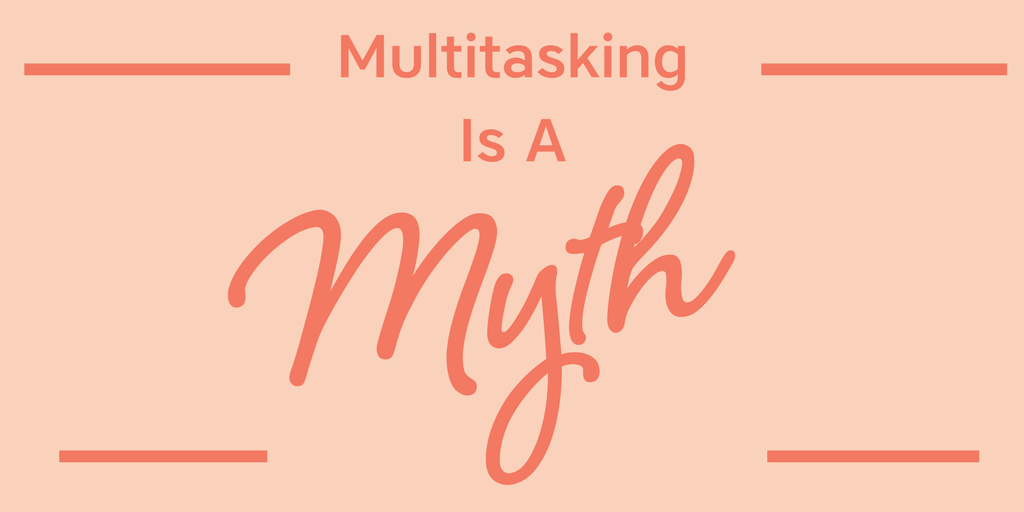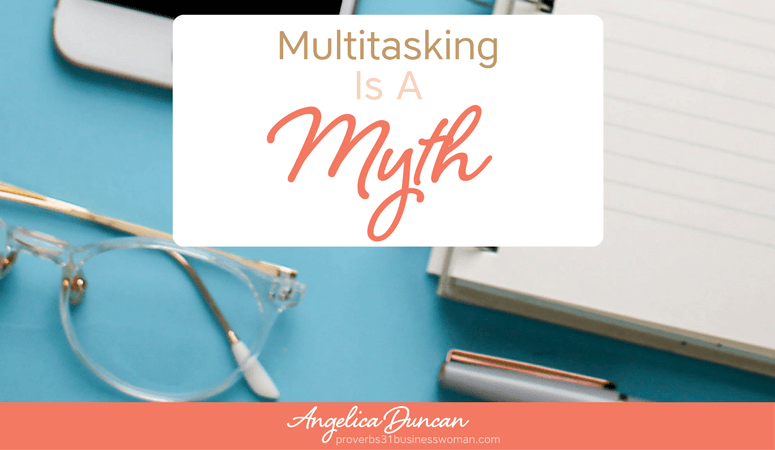What if I told you that multitasking is a myth. (We’ve been duped, ladies!) We all understanding multitasking to be the art getting more things done, at once, in less time. But are we really as productive as we believe we are being?
Some believe that multitasking actually takes away from the quality and quantity of the work we do. In other words, we aren’t getting more done in less time. We are actually getting less done, in that same amount of time, with a lower quality of work.

The Truth – Multitasking Is A Myth
We’ve all done it.
Cooking dinner.
Listening to the evening news.
Helping the kids with homework or a project.
Talking to our husbands about their day at work.
Responding to a friend’s text message.
Checking Facebook for the latest updates.
All. At. The. Same. Time.
While we may think we’re multitasking and handling everything like a boss, we’re actually being deceived. If we’re truly honest with ourselves, there are moments within this very scene that are a bit chaotic in our minds, we may even get into an emotional tizzy, and something doesn’t get done, as well as it should.
(Look, I’ve been known to burn some portion of dinner, in scenes like this.)
Let’s take a deeper look at multi-tasking and if we are truly being as productive as we once thought.
It’s time to wave the white flag and come to grips with the fact that multitasking is a myth. I think we’d be better off as entrepreneurs and leaders, if we’d embrace our brain’s ability to do what it does well with focus and thinking. We may surprise ourselves, by actually getting more done in less time AND having a higher quality of work produced.
Today we’re going to take a closer look at the reality that multitasking is a myth.
Highlights & Ah-Ha’s
- We’re not really multitasking – we’re “switch-tasking.”
- Deep focus, which leads to deep thinking on our tasks will produce remarkable results!
- There’s a boring solution that works. (It’s SUPER BORING, but your brain will thank you for it! #promise)
- Two Books I’m recommending for you:
- If reading is not your jam, then Try Audible!
- New to Audible? Here’s 2 FREE Audible Books, as a new listener! Start listening NOW!
Now Keep Reading!
Here’s why I believe multitasking is a myth (and a big old fat lie, at that!)
1. Multitasking Is Really More Like – Switch-Tasking
Let me explain. . .
For those of us who believe we are great multi-taskers, all we’ve done is mastered the art of switch-tasking. Basically, what you are doing is simply switching tasks…very quickly.
According to neuroscience, each time you switch tasks, your brain has to go through the start-stop sequence. Believe it or not, this sequence is rough on our brains, especially if you are attempting to conquer multiple tasks in a short amount of time, by multi-tasking. In doing so, you actually lose a few (milli)seconds of time. While that may not seem like a lot of time, it adds up very quickly for serial multitaskers.
When we are engaged in multiple tasks at one time, we double the amount of time it takes to complete a task AND we, at least, double the amount of mistakes we make. Research keeps telling us that multitasking makes us less efficient, we make more mistakes, and over time it drains our energy. (But we’re just not listening.)
Dave Crenshaw actually explains this idea of switch-tasking, in his book: The Myth of Multitasking: How “Doing It All” Gets Nothing Done. He delves deeper into the myth of multitasking to discuss background-tasking and how to be more productive, by doing less.
You can grab this book on Amazon or even listen to it on Audible. New to Audible? Here’s 2 FREE Audible Books, as a new listener! Start listening NOW!
Try Audible and Get Two Free Audiobooks
Let’s think of the start-stop sequence in this way:
Imagine you are in your car and getting ready to go to work for the day.
So, you get into your car drive for a bit then come to a stop sign, in your neighborhood.
Instead of just stopping, you turn off your car completely, look both ways, then turn your car back on.
Then you come to an intersection with a traffic light.
Again, instead of just stopping you car, you turn it off completely, wait for the light to turn green, then turn your car back on and keep driving.
You do this every time to come to either a stop sign or traffic light.
How long do you think it would take you to get to work?
Just imagine how much extra energy you are using when you stop and start you car each time. Believe it or not, your brain and body could very well experience signs of fatigue from doing this. Consider how much extra gas your car is using, even the intermittent wear on your car’s engine.
It’s the same thing with multi-tasking. Our brains go through this start-stop sequence where we use more energy, it takes us longer to complete tasks, and even makes the quality of the task we complete lower than expected.
We just can’t expect to have high quality results, by multitasking our way through life.
2. Deep Focus Produces Deep Thinking
One thing research has proven over the years is that our brains have the ability to amazing things. One of those amazing things is that it can think deeply, which allows you to produce better outcomes from whatever task you are doing, at the time (reading, listening to music, dancing, drawing, cleaning your home, cooking, etc.)
However, when we are in the act of multitasking we aren’t in deep focus. We’re in this place of surface, mundane thinking that only allows us to produce but so many outcomes, at one time.
Even those outcomes aren’t high-quality.
Deep focus is what actually allows our brains to go into the deep thinking process. It’s in this deep thinking process, where we can produce higher quality outcomes that are more representative of our skills, talents, and abilities, at their highest level.
The other thing we have to consider is that, by multitasking, we are training our brain to NOT focus deeply. Over time our brains will become accustomed to only short-term, shallow thinking, as its primary way to function. (That’s not good.)
Here’s what ends up happening over time. . .
We end up developing our minds with the inability to handle long-term input, thus giving us low quality output or results. What I mean by “long-term input” is listening to a lecture from a teacher or speaker, reading for long periods of time, and writing in your journal, for example.
What I found most interesting in reading the research on multitasking is, it is believed that a seemingly innocent activity like listening to music while reading, highlighting while reading, or taking notes while sitting through a lecture were all considered multitasking – and were not as productive as doing just one of those tasks, at a time.
Interesting, isn’t it?
Just think about it for a minute, how many times were you sitting in class, taking notes, then you got lost in either your note taking and listening and had to force your brain to go through the start-stop sequence to get bak on track. I never considered this multitasking!
If I’m being honest with you, I’m going to struggle with the whole note-taking piece, simply because I love to take notes, while listening to lectures, teachings, or sermons. They become triggers later on for deeper study, ah-ha’s, or reflection. But at least now, I can be more aware of this fact and maybe take less notes!? (I’m not sure how I feel about that! LOL)
3. The Solution Is “Boring.”
Well, boring to some, that is.
If you really want to be more productive and have a higher quality of work for your finished task, then you need to focus on one task, at a time.
Boring, right?
The reason it seems so boring is that we’ve trained our brains to jump around like a pinball machine from task to task. While it stimulates the brain, there is no quality lasting effect on the brain. Our minds simply crave jumping around all the time.
Here’s what you should do instead:
- Determine which task you need to complete
- Then determine the amount of time it should take to complete the task.
- Block out any distractions.
- Set your timer for the allotted time. (If it’s a longer task, then break it up into intervals of no longer than an hour. Research has proven that your brain loses it efficiency after focusing for one hour, uninterrupted.)
- Then get to work!
Believe it or not you will actually get more done on that particular task, at a higher level and quality than had you attempted to complete the task while engaged with other tasks (aka multitasking).
This is a very similar strategy discussed in the book, The ONE Thing: The Surprisingly Simple Truth Behind Extraordinary Results. It outlines a simple way to get more done, by simply focusing on what matters and then knocking it out of the park! If you haven’t read it, I HIGHLY recommend adding it to your personal library.
You can grab this book on Amazon or even listen to it on Audible. New to Audible? Here’s 2 FREE Audible Books, as a new listener! Start listening NOW!
Try Audible and Get Two Free Audiobooks
Think about it, like this. . .
So, say you are a teacher or speaker and you are set to deliver a lecture. Break your lecture down into 10-20 minute increments. Take short (1-2 minute) breaks where you allow the audience to engage, take notes, or highlight something in their reading. Then pick back up with the next point of your lecture.
But what happens if you are the audience sitting in that lecture? If the teacher or speaker doesn’t know about this research, then how should you proceed?
My advice would be to take light notes (by light, I mean jotting down a quote, or just a few words that will trigger you later on). If you can, record the lecture so you can go back and listen to it, with the ability to pause it as you go along.
[clickToTweet tweet=”If you want to be more productive, quit multi-tasking, once and for all. You’ll lose every time.” quote=”If you want to be more productive, quit multi-tasking, once and for all. You’ll lose every time.”]Wrapping It Up!
One thing is for sure, multitasking isn’t all it’s cracked up to be. What we once thought as being more productive, actually proves to be simply the ability to switch tasks quickly while reducing the quality of our work and the rate, at which we get the work done.
Can we all finally agree that multitasking is a myth?
(I’m waving my white flag. Join me, shall you?)
Let’s Chat!
Think about an area in your business and life, where you’ve been multitasking your days away. What’s one thing you can do engage in deeper focus and focuser deep thinking about your tasks? What quality of work do you imagine producing over the next week? I’d love to hear your thoughts! You can chime in, by clicking here!





Yes to this Angelica!
I will be able to stay focus on all the things I want to complete is make a list. Once I compete a task I can check it off my list. This is the only way for me to stay focused and complet without getting frustrated and quitting.